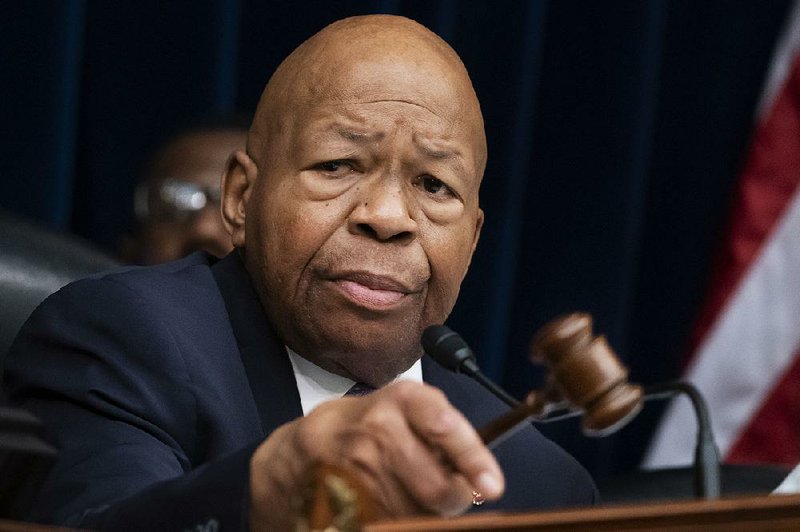WASHINGTON -- President Donald Trump and his businesses, seeking to brush back congressional investigators, sued the chairman of the House Oversight and Reform Committee on Monday to try to quash a congressional subpoena for their financial records.
The lawsuit, filed in U.S. District Court, argued that the committee's chairman, Rep. Elijah Cummings, D-Md., had no legitimate legislative reason to subpoena an accounting company tied to the president, so his subpoena should be deemed invalid and unenforceable.
"The Democratic Party, with its newfound control of the U.S. House of Representatives, has declared all-out political war against President Donald J. Trump," lawyers for the plaintiffs wrote in their complaint. "Subpoenas are their weapon of choice."
The lawyers are also seeking a court order blocking the accounting company, Mazars USA, from handing over the information, which they say would "expose plaintiffs' confidential information."
The suit, which is almost certain to face a challenge in court, is a familiar move for Trump, honed over a long and litigious business career. It mirrors other efforts in recent weeks by personal lawyers for the president and his businesses to block the Democratic-controlled House from gaining access to Trump's finances.
If nothing else, the suit and possible countersuits could delay the release of the documents sought by Democrats.
"With this subpoena, the Oversight Committee is instead assuming the powers of the Department of Justice, investigating (dubious and partisan) allegations of illegal conduct by private individuals outside of government," the lawyers wrote. "Its goal is to expose plaintiffs' private financial information for the sake of exposure, with the hope that it will turn up something that Democrats can use as a political tool against the president now and in the 2020 election."
Trump and his businesses were not party to the Democratic subpoena, which was sent to Mazars earlier this month seeking financial records and communications related to Trump and his businesses after Michael Cohen, Trump's longtime attorney, told the Oversight Committee that his former boss had intentionally misrepresented his assets and liabilities to suit his needs. Inflating the value of assets would help the Trump Organization secure loans. Deflating the value of assets would minimize tax liability.
On Monday, Cummings said the Trump lawsuit was not a surprise given Trump's "long history of trying to use baseless lawsuits to attack his adversaries," but he argued that neither he nor his businesses had a "valid legal basis to interfere with this duly authorized subpoena from Congress."
"This complaint reads more like political talking points than a reasoned legal brief, and it contains a litany of inaccurate information," Cummings said, accusing the White House of across-the-board stonewalling of his committee.
After the subpoena was issued, lawyers representing Trump in the congressional inquiries, William S. Consovoy and Stefan Passantino, made arguments similar to those laid out in the lawsuit directly to Mazars, urging the company not to comply. Republicans on the Oversight Committee have made similar arguments.
"The legal system is part of Trump's strategy in almost everything that he does," said Jack O'Donnell, a former president of the Trump Plaza casino in Atlantic City, N.J., who has since become a critic of his former boss. In his career in business, O'Donnell said, "he uses the law very tactically. He uses it to slow things down."
During the 2016 election campaign, USA Today calculated that Trump and his companies had been involved in 4,095 lawsuits over the previous three decades, including defamation suits, trademark suits and employment litigation. Most have been either settled or dismissed but only after churning out headlines.
"He uses suits to create agitation with his enemies," said Jay Goldberg, a Manhattan, N.Y.-based attorney who represented Trump as a litigator for 15 years, through both of his divorces. "They have to get lawyers, and there are built-in costs. These matters are usually settled or dismissed, but he uses it as a weapon."
On Monday, a spokesman for Mazars declined to comment on the suit but said the company would "respect this process and will comply with all legal obligations." It was unclear if it still intended to fulfill the subpoena by an April 29 deadline set by Cummings.
Cummings is not the only Democratic chairman pursuing details of Trump's long-obscured finances. The Intelligence and Financial Services committees have each issued subpoenas to other financial institutions, including Deutsche Bank, a longtime lender to Trump's businesses.
And the House Ways and Means Committee has demanded six years of tax returns filed by Trump and his businesses. The panel set a deadline of today for the IRS to comply with the demand, filed not by subpoena but under a provision in the tax code that says the IRS "shall" comply with requests from the chairman of the House and Senate tax-writing committees.
A Section on 04/23/2019
